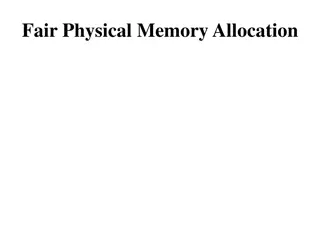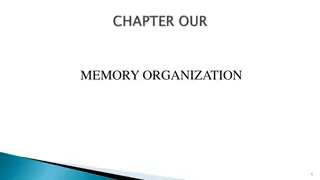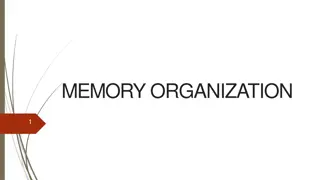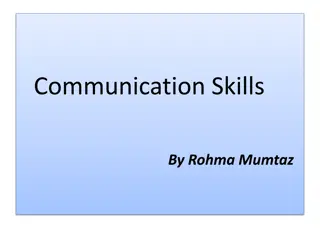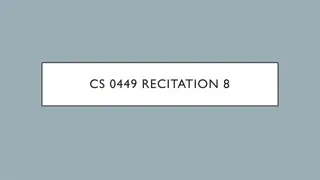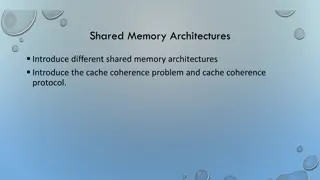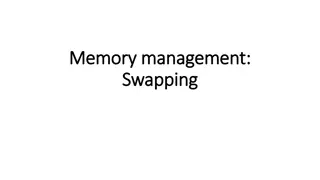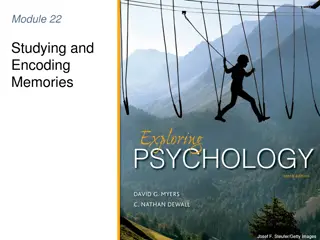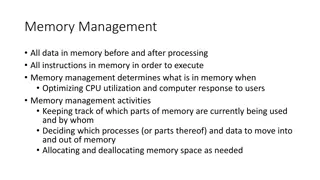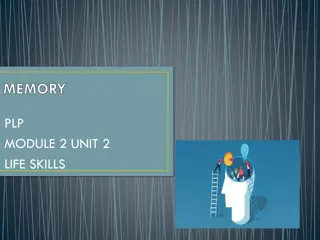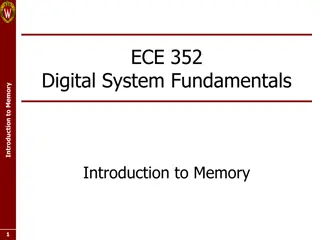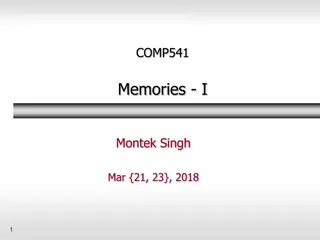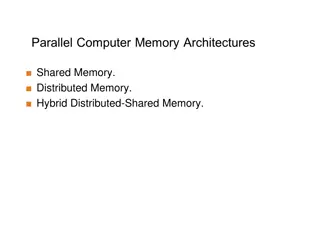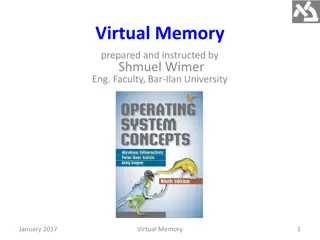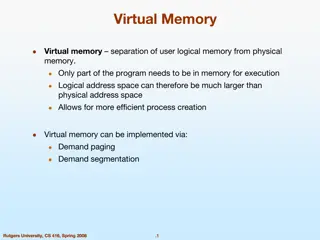Enhancing Oral Communication Skills: 5 Memory Secrets for Effective Speaking
Explore five key memory secrets for improving oral communication skills, including the role of repetition, implicit versus explicit learning, chunking techniques, preventing forgetting, and strategies for retrieval and fluency building. Discover how visuals, rehearsal activities, and activating the phonological loop aid in language retention and proficiency development.
Download Presentation

Please find below an Image/Link to download the presentation.
The content on the website is provided AS IS for your information and personal use only. It may not be sold, licensed, or shared on other websites without obtaining consent from the author. Download presentation by click this link. If you encounter any issues during the download, it is possible that the publisher has removed the file from their server.
E N D
Presentation Transcript
Cinq secrets de la Cinq secrets de la m moire pour la m moire pour la communication orale communication orale FTA mars 2021 Steve Smith @spsmith45 spsmith45@aol.com
Outline Outline 1. The role of repetition in the Working Memory model 2. Implicit learning versus explicit learning for memory 3. Using chunking to build oral proficiency 4. Preventing forgetting 5. Retrieval and fluency building
Multi Multi- -storage model of memory storage model of memory Working memory (where you have things in mind ) Environment Learning Remembering Forgetting Long-term memory (your factual and procedural knowledge)
French teacher French teacher takeaways 1 takeaways 1 Visuals. Easier to explain something to students when they have a visual focus to channel their attention. Visually represent one use of the imperfect and perfect tenses in French by drawing a river with bridges. River represents continuing flow of an event something was happening (imperfect tense) while the bridges represent interruptions to the flow something happened (pass compos ).
French teacher takeaways 2 French teacher takeaways 2 Rehearsal Any activity which allows students to rehearse language out loud or in their heads via the phonological loop aids retention. For example, when a student is rehearsing an answer in their head before they put up their hand, or when a student is silently replaying a phrase they have heard before they write it down. Examples: delayed dictation, delayed copying, disappearing text , memorising answers for an oral assessment. Using the wait time technique in class.
French teacher takeaways 3 French teacher takeaways 3 When we listen, speak, read aloud or read silently we activate the phonological loop in working memory Value of following text while listening Value of phonics in early stages Pronouncing accurately helps with listening and reading comprehension which in turn develop oral fluency and accuracy A reading aloud element will be part of the new GCSE in England from 2025.
French teacher takeaways 4 French teacher takeaways 4 Elaborate processing Forces the student to hold a word in WM for longer than the few seconds whilst engaging the brain in higher order thinking. Examples: using vocab in different contexts, often in collocations synonyms, antonyms, mnemonics Argument against just learning meanings with apps or lists
Main takeaway? Main takeaway? Oral proficiency builds over time thanks to comprehensible input which doesn t overload working memory, interaction and much repetition Long term gains from exploiting what we know about WM and LTM attention, rehearsal and elaborate processing
Implicit learning Implicit learning First language acquisition Implicit knowledge (unconscious) Procedural memory/knowledge Age-related? Oral communicative competence derives mostly from input over time
Explicit learning Explicit learning Conscious learning with awareness Intentional Declarative knowledge knowing about the language Big question! The interface can explicit knowledge become implicit? Good for metacognitive strategy development, e.g. knowing what you have to do to get the best mark in an oral assessment.
Oral proficiency Oral proficiency Develops over time principally as a result of implicit learning. Explicit teaching of words, chunks and grammar helps.
Chunking Chunking List one: XCA2PLO3B1FJZ4DH List two: 1FBI2BBC3CIA4SKY
Chunk and chain Chunk and chain Mardi dernier // je suis all e / au cin ma // avec mes copines.
Words Words + + grammar grammar or lexical or lexical chunks chunks? ? Oral fluency will develop more easily when language is encountered and practised in chunks (blocs lexicalis s).
Cinma et tl Ce que j aime regarder la t l (What I like to watch on TV) Ce que j aime regarder au cin ma (What I like to watch at the cinema) Ce que j aime regarder en ligne (What I like to watch online) c est (is/are) les s ries comiques, comme (comedy series, like ) les vid os sur YouTube (videos on YouTube) les s ries dramatiques, comme ) (drama series, like ) les films d action, comme (action movies, like ) les films comiques, comme.. (comedy films, like ) les vlogs, comme (vlogs, like ) les s ries am ricaines (American series) la science fiction/la fantaisie (sci fi/fantasy) les vid os de musique (music videos) les missions sportives (sports programmes) les infos (news) et (and) et (and) et les documentaires sur la science ou les animaux (documentaries about science or animals) (and) la t l r alit , comme (reality shows, like..) Par exemple (for example) Le weekend dernier (last weekend) Hier soir (last night) Samedi dernier (last Saturday) j ai vu (I saw)) amusant (funny) j ai regard (I watched) super (great) C tait je suis all (e) au cin ma et j ai vu (I went to the cinema and saw ) divertissant (entertaining) (It was) d cevant (disappointing)
Ce que jaime re. la t (What I like to watch on TV) Ce que j aime r au ci . (What I like to watch at the cinema) Ce que j .. regarder en ligne (What I like to watch online) c est (is/are) les s ries co ., comme (comedy series, like ) les vi .. sur YouTube (videos on YouTube) les s ries dra .., comme ) (drama series, like ) les ..d action, comme (action movies, like ) les .. co ., comme.. (comedy films, like ) les vlogs, (vlogs, like ) les s . am ricaines (American series) la science fiction/la fan (sci fi/fantasy) les .. de musique (music videos) les miss . sporti . (sports programmes) les inf.. (news) et (and) et (and) et les doc sur la sci .. ou les a .(documentaries about science or animals) (and) la t l r .. (reality shows) Par ex .(for example) Le weekend d . (last weekend) Hier s (last night) Sa .. d .. (last Saturday) j ai .. (I saw)) am ..(funny) j ai re .(I watched) su (great) C t je suis au cin ma et j ai .. (I went to the cinema and saw ) div . (entertaining) (It was) d (disappointing)
Lesson sequence Lesson sequence 1. Read aloud some examples. Start with just the first row. 2. Do some choral repetition for pupils to get used to saying the sentences. 3. Get pupils in pairs to make up sentences (or do this as a whole class task with hands up or down) 4. Then move to the next line and so on. 5. In the end get pupils to make up full descriptions using all three lines. 6. Then take away the displayed items and see what they can do from memory.
Lesson sequence Lesson sequence 7. If the above needs support use the aural gap-fill technique , i.e. give them parts of each sentence orally, then they complete. 8. With some classes you could invite them to make up their own additions in each slot some will ask about other destinations. 9. Do some call and response translation into French. 10. Pupils recording their mini talks at the end or for homework if you give them a copy of the sentence frame. 11. Consider using a gapped version of the sentence builder. 12. Play Mind reader Which sentence am I thinking of?
One chunk at a time game One chunk at a time game In pairs or groups. Give the whole clas a starter chunk: le weekend dernier In turn each person adds a chunk to the previous one, making up a story as they go along. If a sentence comes to a natural end a pupil can say point , then a new sentence begins.
ZUC! QAX! 4
Forgetting: the Ebbinghaus curve Forgetting: the Ebbinghaus curve La courbe de l oubli Number of hours between study and test
Planning of lessons/lesson sequences Spacing for Spacing for building building oral oral proficiency proficiency Curriculum plan Value of massed practice versus spaced practice (bachotage et pratique distribu e)
Oral assessment prep Oral assessment prep Last minute rote learning helps Using gapped versions of paragraphs for self-quizzing Rehearsing with eyes closed Using a text to speech site or app Using bullet point notes Using picture prompts
Segalowitz (2016) What is fluent What is fluent retrieval from retrieval from memory? memory? Utterance fluency Cognitive fluency Perceived fluency https://core.ac.uk/download/pdf/78101209.pdf
Paul Nation (1991) having ready access to knowledge you already possess (p.1). from the very first day of learning a language, you can be fluent in the small amount of language you already know (Nation, 2008). Nation, I.S.P. (1991). Fluency and learning. The English Teacher, (20), 1 8. http://www.victoria.ac.nz/lals/about/staff/publications/paul-nation/1991-Fluency-MELTA.pdf Nation, I.S.P. (2008). Developing fluency in reading. Video of seminar conducted at Seoul National University of Education: Compass Media. http://www.compasspub.com/english/teachers/seminars_view.asp?sch_kind=&sch_value=&knd=&h_seq =65&h_page=1
Fluency tasks for oral communication Fluency tasks for oral communication Activities where language is retrieved from LTM under time pressure 3,2,1 task Just a minute Speed dating Instant teacher-led or paired translation from English to French
Bref Bref Oral proficiency develops over time primarily because of the ability to interact with comprehensible language Words + grammar probably not the best approach Spaced, repeated encounters with relevant language presented in chunks and texts Practice and deliberate memorisation help with the retrieval, chunk and chain process Memory comes largely from implicit learning but we can use knowledge about Working Memory to build long-term retention Fluent recall can be practised




















